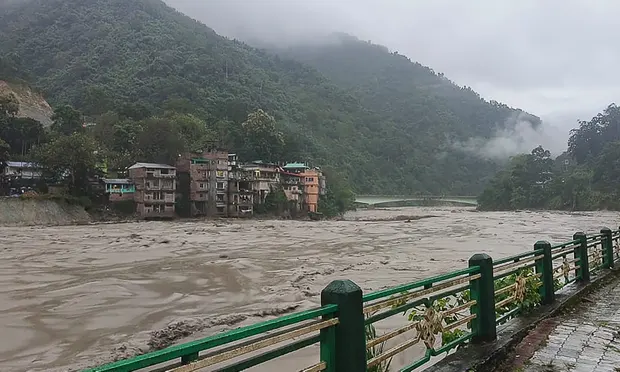On Wednesday, a tragic sequence of events unfolded in India’s Himalayan region when a sudden cloudburst over the Lhonak glacial lake sparked severe flash floods. The incident occurred in the Teesta valley, situated 150 km north of Gangtok, the Sikkim state capital, resulting in at least 18 fatalities and leaving nearly 100 people missing.
The lake’s banks ruptured due to the cloudburst’s huge amount of rain that fell in a brief period of time. The Teesta valley, which is close to the Chinese border, experienced devastating flash floods as a result. As of early Thursday, according to the state’s crisis management organisation, 102 people were still missing and 26 were injured.
According to authorities, more than 22,000 individuals have been impacted by the water. There are 22 soldiers who are missing. As a result of the key roadways and bridges being destroyed by the floods, more than 3,000 tourists are now stranded.
The Lhonak Lake overflow was made worse by a cloudburst that dumped five times the typical amount of rain on the state. As a result, a dam in the Teesta valley partially collapsed, resulting in even greater devastation.
The Teesta River is running quickly, there is constant rain, and many roads and bridges have been washed away, making rescue efforts difficult. Authorities have issued a warning that rescue efforts will be difficult since further rain is expected in the next few days and because mobile and phone lines are still down.
This episode is the most recent case of harsh weather in South Asia’s fragile Himalayan mountain range. The area has recently experienced extreme and unseasonable rainfall, flooding, and landslides as a result of climate change.
The tragedy highlights how highly vulnerable this area is to climate change. “Sadly, this is the latest in a series of deadly flash floods that ricocheted across the Hindu Kush-Himalayan region this monsoon, bringing the reality of this region’s extreme vulnerability to climate change all too vividly alive,” said Pema Gyamtsho, director general of the Nepal-based International Centre for Integrated Mountain Development.








Leave a Reply